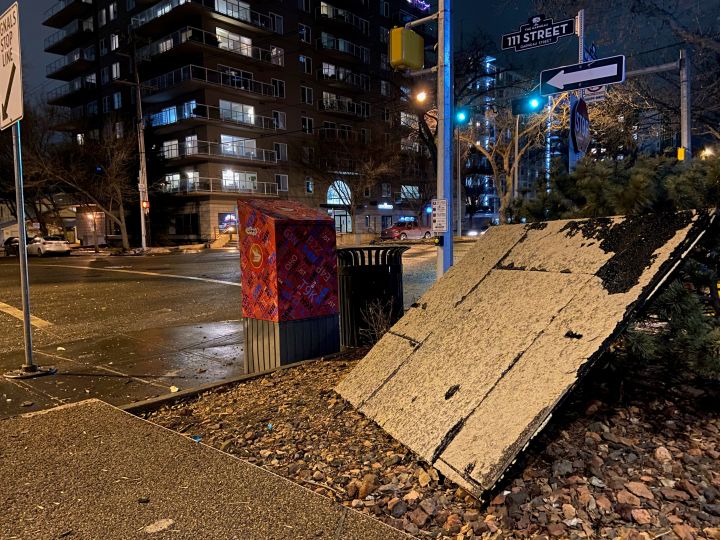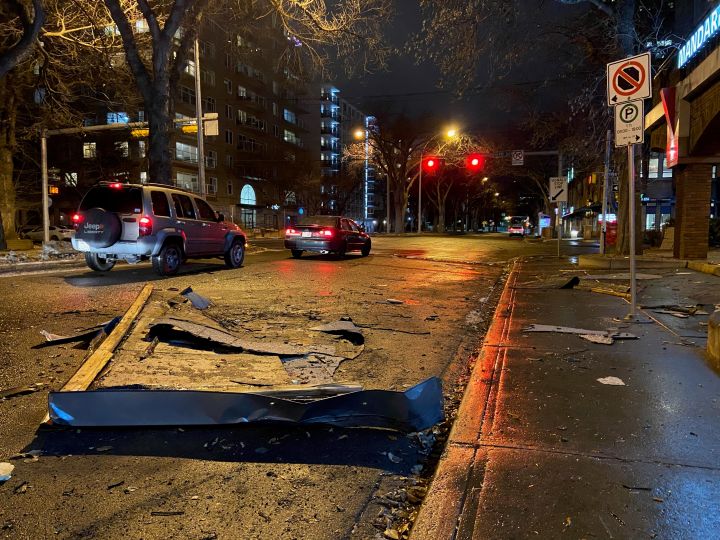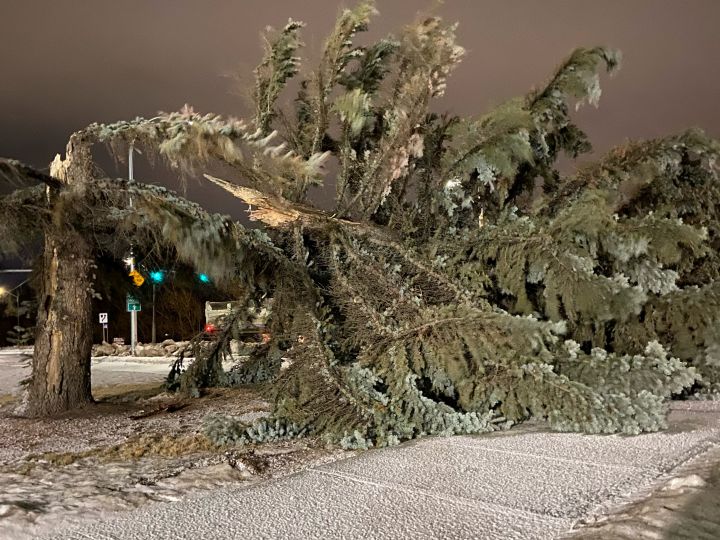A snow squall warning was issued for a section of northern and central Alberta, including the Edmonton region, and on Tuesday evening the wind hit the city suddenly and with ferocious energy.

Snow squalls cause weather conditions to vary considerably, Environment Canada said, and changes from clear skies to heavy snow within just a few kilometres are common.
Rarely seen in Alberta, snow squall warnings are issued when brief but intense bursts of heavy snow will produce near-zero visibility.
The high winds arrived in Edmonton around 7:30 p.m. — toppling trees, downing power lines, ripping shingles and siding from homes and tossing belongings to and fro.
The snow squall warning was later dropped and replaced with a wind warning.
“Strong winds gusts between 90 and 120 km/h will spread from northwest portions of Alberta to areas near the Saskatchewan border by late this evening and will subside before morning,” Environment Canada said on its website.
“Damage to buildings, such as to roof shingles and windows, may occur. High winds may toss loose objects or cause tree branches to break.”
All weather warnings were dropped in Alberta at around 9:45 a.m. Wednesday.
The utility provider EPCOR tweeted Tuesday night that it was “experiencing high call volumes due to multiple outages across the city.”
“We appreciate your patience as we answer calls as quickly as possible,” EPCOR tweeted.
Kelly Struski, a communications manager at EPCOR, told Global News that about 5,000 customers were experiencing power outages across Edmonton on Tuesday night.

Get breaking National news
“Our first priority is always the safety of the public and our crews,” she said, adding that if anyone sees a downed power line, they should maintain a minimum of 10 metres of distance from it and assume it is “energized.”
Struski said if someone hits a downed power line with their vehicle, they should remain in the vehicle. In either case, people should call 911 or EPCOR’s “trouble line” if they come across a downed power line.
When asked if EPCOR was caught off guard by the powerful winds, Struski said the utility provider is always prepared for adverse conditions.
Click here for information on EPCOR power outages.
Shortly before 8:30 p.m., the Edmonton Police Service issued an advisory that drivers should avoid Calgary Trail between 41 Avenue and 19 Avenue S.W. in the city’s deep south.
“Three semi-tractor-trailer units have rolled over as a result of strong winds,” the EPS said.
“One lane remains open at this time, though motorists are being asked to find an alternative route until further notice, if possible, to ensure the safety of first responders on scene.”
Police said no injuries were reported. EPS added that only one rollover occurred in Edmonton proper — two of the rollovers occurred just outside its jurisdiction.
Global Edmonton meteorologist Jesse Beyer said he believes the weather agency issued the snow squall warning since the expected weather conditions don’t meet the accumulation criteria for snowfall or winter storm warnings, or the duration required for a blowing snow advisory.
The winds moved on within about 30 minutes, almost as suddenly as it arrived.
The warned stretched from the Peace River region in the north, south of Edmonton to the Pigeon Lake, Drayton Valley, Rimbey, Camrose and Wetaskiwin areas.
Periods of brief but intense snowfall also came through the region, causing visibilities to be rapidly reduced due to the heavy, blowing snow.
Wind warnings were also in effect along the mountains and foothills to the west, and along the Alberta-Saskatchewan border to the east.
Strong winds gusts between 90 and 120 km/h spread from northwest portions of Alberta to areas near the Saskatchewan border late Tuesday evening.
Want your weather on the go? Download Global News’ Skytracker weather app for iPhone, iPad and Android.












Comments